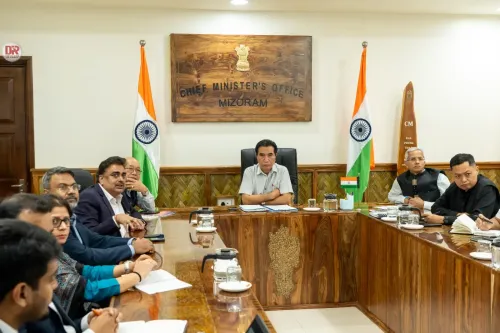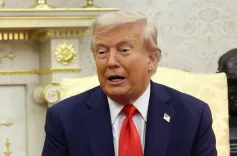Why Does the World Trust India to Build the Future of Semiconductors?
Synopsis
Key Takeaways
- India is establishing itself as a global semiconductor leader.
- Investments of $18 billion have been made in semiconductor projects.
- The global semiconductor market is set to exceed $1 trillion.
- Next-gen reforms will enhance the competitive landscape.
- Design centers in Noida and Bengaluru are developing advanced chips.
New Delhi, Sep 2 (NationPress) Prime Minister Narendra Modi stated on Tuesday that the global community now has confidence in India and is eager to collaborate in shaping the future of the semiconductor industry. He announced that the government is preparing to unveil a series of next-generation reforms for this sector.
During the inauguration of the ‘Semicon India 2025’ event, PM Modi emphasized India's expanding influence in the international chip market, asserting that the nation is poised to play a crucial role in the trillion-dollar semiconductor industry.
“Since 2021, investments totaling $18 billion have been allocated to 10 semiconductor projects,” PM Modi remarked. “The world has faith in India, believes in India, and is ready to partner with India for the future of semiconductors,” he added, highlighting that while the previous century was driven by oil, the upcoming era will be defined by chips.
He noted that the global semiconductor market has already reached $600 billion and is on the verge of surpassing $1 trillion, with India set to play a significant role in this growth.
“Our semiconductor ecosystem goes beyond chip manufacturing; we are establishing a competitive and Atmanirbhar environment in the industry,” PM Modi asserted.
He mentioned that design centers in Noida and Bengaluru are engaged in developing some of the world’s most sophisticated chips, addressing the challenges within the global semiconductor landscape.
The Prime Minister also showcased India’s economic resilience, revealing that the country achieved a 7.8 percent growth in the April-June quarter amidst worldwide uncertainty.
“Recently, GDP figures for the first quarter of this year were published. Once more, India has exceeded all expectations and assessments. In a time of global economic challenges, India has managed a growth rate of 7.8 percent,” the Prime Minister conveyed to the audience.
PM Modi expressed that this achievement illustrates that India is on the right path toward becoming a product-driven nation.
Union Electronics and IT Minister Ashwini Vaishnaw also spoke at the event, encouraging international companies to establish manufacturing operations in India, stating that the nation has built a robust foundation for the semiconductor industry within a short span.
The three-day ‘Semicon India 2025’ conference, taking place from September 2 to 4 at Yashobhoomi, is themed “Building the Next Semiconductor Powerhouse.”
Co-organized by the India Semiconductor Mission (ISM) under the Ministry of Electronics and Information Technology (MeitY) and SEMI, the global semiconductor industry association, this event stands as one of the largest industry congregations in South Asia, featuring over 350 exhibitors from 33 countries, more than 15,000 visitors, six country roundtables, four country pavilions, and participation from nine Indian states. Sessions will delve into semiconductor fabs, advanced packaging, research and development, artificial intelligence, smart manufacturing, state-level policies, and investment opportunities.









